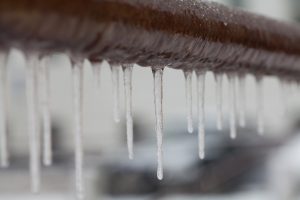 If you haven’t already taken steps to winterize your home, now is certainly the time to do it, before we’re under heavy amounts of snow. Winterizing your home includes fixing any drafts that can lower your HVAC efficiency, making sure your heating system is maintained, and ensuring your pipes are protected.
If you haven’t already taken steps to winterize your home, now is certainly the time to do it, before we’re under heavy amounts of snow. Winterizing your home includes fixing any drafts that can lower your HVAC efficiency, making sure your heating system is maintained, and ensuring your pipes are protected.
The latter is particularly important, as neglecting this winter task can leave you with frozen pipes, and eventual pipe ruptures. This is most likely to happen with the exposed pipes that lead outdoors as well as exposed pipes around your water heater, but it can essentially occur anywhere in the home where pipes face too much cold without appropriate insulation.
Why Frozen Pipes Are Such a Problem
The first thing you should do when you encounter frozen pipes is contact a professional plumber in Glenview, IL, such as any one of the members of our team. But we’d like to let you know why this is such a problem in the first place.
Frozen plumbing means not only will your water not flow, but that your pipes are at risk of bursting. This, of course, leads to damaging flooding and expensive repairs. But why does this happen? The answer may surprise you.
What Leads to Burst Pipes
When water freezes, it increases in volume. This happens because the molecular structure of ice is different (hexagonal) than that of liquid water, and therefore takes up more space. If you’ve ever put a glass container of water in the freezer to later discover that the glass was cracked, it’s due to the expansion of the ice.
However, this isn’t why pipes burst when they freeze! This typically surprises our customers, since it seems like an obvious answer. But the actual cause of burst pipes from freezing is due to the increase in pressure within your plumbing.
As the water goes through the process of freezing and expanding, it pushes the remaining water toward closed faucets, creating a large pressure build-up. This can be enough to cause lateral bursting along your pipes. The “upstream” part of the pipe is in the most danger, since the water on the other side still has plenty of room to absorb the pressure rise.
Don’t Try to Thaw Pipes out On Your Own
If you attempt to thaw out frozen plumbing on your own, you end up increasing the pressure inside it. In fact, a frozen pipe is more likely to burst during thawing, for this reason. Unfortunately, we get too many calls for repairs or hear about injuries after homeowners have tried to thaw out their own pipes.
Not only will burst pipes lead to property damage, but they can, naturally, cause injury to you as well. Individuals have tried methods such as space heaters, hairdryers, and even blow torches to thaw their pipes—these are all bad ideas. Give our plumbers a call and we will use the appropriate methods and tools to get your plumbing back up and running.
For expert plumbing service, installations, or maintenance contact Reliance Plumbing Sewer & Drainage, Inc. Our knowledgeable plumbers serve the North Shore and Northwest Chicago suburbs. Rely on Reliance!
